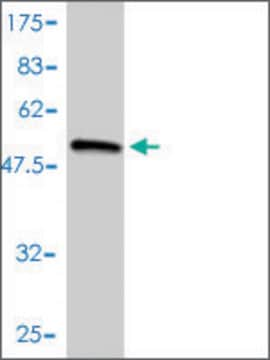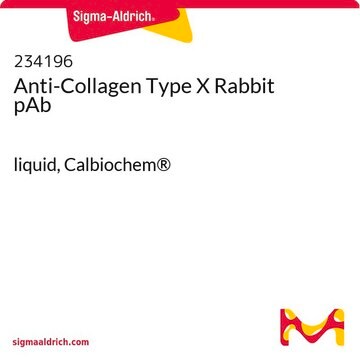MAB1330
Anti-Collagen Type II Antibody, clone COLL-II
ascites fluid, clone COLL-II, Chemicon®
Synonym(s):
Anti-ANFH, Anti-AOM, Anti-COL11A3, Anti-SEDC, Anti-STL1
About This Item
Recommended Products
biological source
mouse
Quality Level
antibody form
ascites fluid
antibody product type
primary antibodies
clone
COLL-II, monoclonal
species reactivity
sheep, human, bovine, rat, pig, mouse, canine
manufacturer/tradename
Chemicon®
technique(s)
ELISA: suitable
immunohistochemistry: suitable
isotype
IgG1
NCBI accession no.
UniProt accession no.
shipped in
dry ice
target post-translational modification
unmodified
Gene Information
human ... COL2A1(1280)
Specificity
Immunogen
Application
Western Blot: 1:1000-1:2000 with chemiluminescent detection
ELISA at 1:100-1:500, pepsin treated samples.
Optimal working dilutions must be determined by the end user.
Cell Structure
ECM Proteins
Physical form
Storage and Stability
Analysis Note
Cartilage in lung or fetus
Other Notes
Legal Information
Disclaimer
Not finding the right product?
Try our Product Selector Tool.
Storage Class Code
11 - Combustible Solids
WGK
WGK 1
Flash Point(F)
Not applicable
Flash Point(C)
Not applicable
Regulatory Listings
Regulatory Listings are mainly provided for chemical products. Only limited information can be provided here for non-chemical products. No entry means none of the components are listed. It is the user’s obligation to ensure the safe and legal use of the product.
JAN Code
MAB1330:
Certificates of Analysis (COA)
Search for Certificates of Analysis (COA) by entering the products Lot/Batch Number. Lot and Batch Numbers can be found on a product’s label following the words ‘Lot’ or ‘Batch’.
Already Own This Product?
Find documentation for the products that you have recently purchased in the Document Library.
Our team of scientists has experience in all areas of research including Life Science, Material Science, Chemical Synthesis, Chromatography, Analytical and many others.
Contact Technical Service







